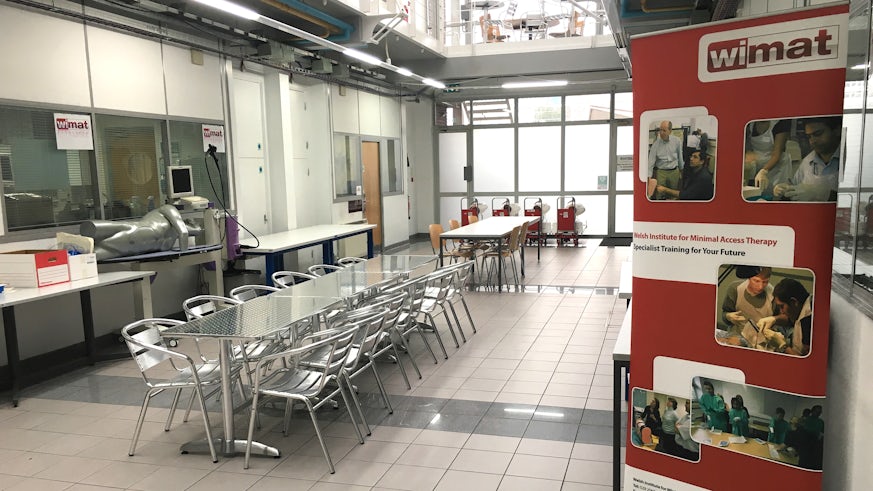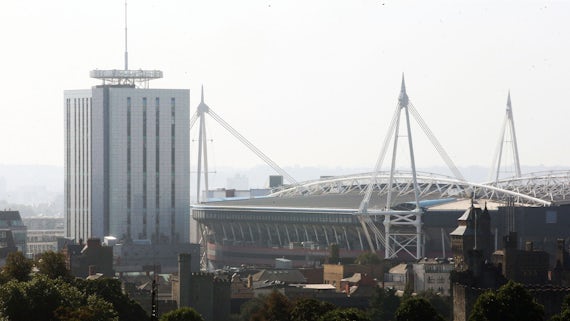Medicentre celebrates 25 years of success
23 November 2017

The Cardiff Medicentre is marking its 25th year with stories of success.
A 23 November event, featuring Professor Sir Mansel Aylward, Chair of Life Science Hub Wales, will highlight some of the companies that have improved patient healthcare, tackled clinical challenges and changed medical education.
Established in 1992 by Cardiff University, Cardiff & Vale University Health Board, Cardiff Council and Welsh Government, it is now run jointly by the University and Health Board.
Located on the grounds of the University Hospital of Wales, the Medicentre provides laboratory and office space to some of the UK’s most exciting medtech and biotech companies. Staff are dedicated to supporting early-stage life sciences businesses, helping resident companies grow into successful operations that sell products and services globally.
See how the University and University Health Board work together for clinical innovation.
The anniversary coincides with a new grant funding award for MedaPhor, a Medicentre tenant specialising in ultrasound – when sound is used to visualise tissues. The University spin-out has received a £466,000 Innovate UK grant to develop an augmented reality needling product.
Doctors use needling to biopsy small samples of body tissue, drain fluid through tiny tubes and administer regional anaesthesia. Clinicians need to be able to see the needle-tip when performing the procedure, so as not to damage other tissues, so they often rely on ultrasound – a safe imaging technique that can be brought to the patient’s bedside.
MedaPhor aims to improve needling with an artificial intelligence technique known as deep learning and an augmented reality headset for doctors to wear. By providing needle pathway guidance, automatically tracking the needle-tip and having the ultrasound virtually displayed directly over the patient, the system aims to minimise the potential for user error and expand the use of ultrasound guided intervention within the clinical environment.
The headset projects the ultrasound view over the patient's anatomy, highlighting the pathway the needle needs to follow and automatically tracking the needle tip to ensure it does not damage key anatomical structures.
Professor Keith Harding, Dean of Clinical Innovation at the University, said: "The Medicentre is an essential component of the shared strategy for clinical innovation between Cardiff University and Cardiff & Vale University Health Board. It is an effective and purpose-built space for translating great ideas into improvements and innovations in the health service..."
"The Medicentre has been generating success stories for 25 years and helps ensure Cardiff and Wales are seen as international leaders in this space."
Dr Sharon Hopkins, Deputy Chief Executive and Executive Director of Public Health for Cardiff & Vale University Health Board (UHB), said: "We are delighted to be celebrating 25 years of the Medicentre and this well-established and unique partnership that has developed here.
"Clinical innovation is not a new concept for Cardiff University and Cardiff & Vale UHB. Both organisations have a strong track record of working together, but the joint partnership reaffirms a commitment to develop relationships with industry, other UHBs and Government to translate existing research into patient and health economic benefits and identify as yet unmet clinical needs..."
"The continued evolution of the Medicentre remains an exciting part of the health sector, which develops and delivers ground-breaking concepts and ideas for patients now and in the future."
The Medicentre has helped develop some of Wales’ leaders in clinical innovation. Notable tenants and alumni include Alesi Surgical, Q Chip and Synexus Clinical Research.
It has helped 11 companies grow to the point of relocation or acquisition. When combined, these acquisitions total over £30m.
Share this story
We have a significant impact on Wales and the UK as a whole, in areas including employment, research funding, and teaching and learning activities.







